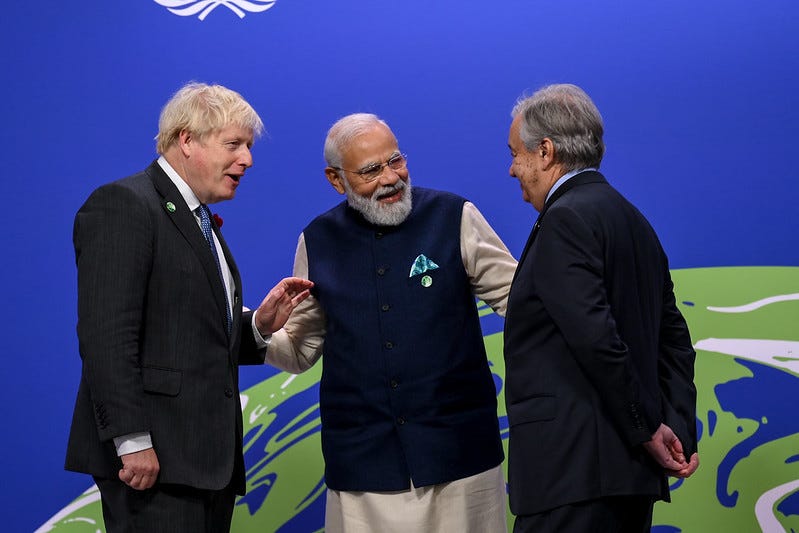For climate finance, COP26 starts Wednesday; plus, methane is the new coal
Welcome to Callaway Climate Insights, and especially to the dozens of new subscribers who signed on for our special COP preview report last week.
Callaway Climate Insights publishes Tuesdays and Thursdays for everybody. To get our insights and analysis every day, please subscribe.

The CEOs and celebrities have landed in Glasgow in their private planes, the global leaders have spoken, they’ve posed for their de rigueur photo together in a lavish hall, and the protesters and normal delegates have been kept out in the Scottish November cold. But for the finance community, COP26 really starts Wednesday.
That’s when former Bank of England Governor Mark Carney, now the leading voice in global climate finance along with perhaps, Larry Fink, has promised a scorecard of what banks are where in their climate commitments. It’s also when the first talks designed to create a global carbon market for emissions begin, in the form of soliciting an elusive agreement to Article 6 of the Paris Agreement, which establishes the market. Finally, it’s when discussions about securing the $100 billion a year for poorer nations to fight climate change really get into full gear.
Amid the pessimism around the United Nation’s annual climate conference this year, sparked by lack of attendance from Russia and China’s leaders and a frustrating pre-meeting of the G20 leaders in Rome, a few bright spots began to appear Tuesday.
A deal among 90 nations to reduce harmful methane from fossil fuel plants and pipelines was greeted as a big success. It was prompted by a new rule from the U.S. Environmental Protection Agency to reduce methane emissions by 41 million tons over the next 14 years. And India pledged to be net zero by 2070, which although 20 years later than everyone else (and 10 years after China), was still regarded as a step forward.
Most surprising was to see Brazil sign on to the global deal to slash deforestation, which would help repair the damage done to the Amazon Basin. Though that global pledge has been made before, to little effect, it was still counted as a day one win by environmental activists.
But for climate finance, which is the key to whether COP26 is a success or failure, the action begins Wednesday. In terms of stepping up, banks and asset managers have developed a large lead over governments in the last few years. Expect more concrete — and doable — results to come in the next few days.
More insights below. . . .
Don’t forget to contact me directly if you have suggestions or ideas at dcallaway@callawayclimateinsights.com.
Tuesday’s subscriber insights: Modi’s promise; the war on methane, Royal Caribbean’s net zero plan, Rivian’s IPO

. . . . It was both a surprise and, in some ways, a disappointment when on Tuesday India’s prime minister, Narendra Modi, pledged that his country would be net-zero by 2070. A bit later than most other national pledges, and not accounting for the fact that 70% of India’s energy comes from coal. Plus, there’s a catch. Modi wants others to pay for it. Can it work? Read more here. . . .
. . . . Is methane the new coal? As the plan to eliminate coal production at COP26 petered out amid opposition from China, Russia, Eastern Europe, Brazil, and well, Sen. Joe Manchin, replaced by a weaker strategy to halt overseas coal financing, a new villain was identified and targeted — methane. Ninety nations pledged to reduce it over the next 10 to 15 years, in what could be the biggest success in fighting climate change to date. But can they do it? Read more here. . . .
. . . . Pitch black and thick as molasses, the fuel oil used by most cruise ships is massively polluting, with the Transport & Environment non-profit estimating that the world’s second largest cruise line, Royal Caribbean (RCI), emitted four times more sulfur dioxide from its Europe-based boats than all the cars on that continent during the same (pre-Covid) period. Now Royal Caribbean wants to go net zero, which could change the game among cruise rivals and appeal to climate conscious passengers. A bold new strategy or empty cruise industry promise? Read more here. . . .
. . . . Shares of electric vehicle makers Nikola Corp. (NKLA) and Lordstown Motors (RIDE) have never recovered from scandals last year tied to phony orders and fake product information, but that hasn’t dampened the enthusiasm for Rivian Automotive, which is planning a blockbuster IPO next week that could value it at as much as $60 billion, in league with Ford (F) and Honda. Is its new electric pickup truck, the R1T, that good? Read more here. . . .
EU notebook: Europe won’t be forced into ‘rash decisions’ to deal with fossil fuel price hikes

. . . . Soaring energy prices in Europe this fall have derailed what had been a collective enthusiasm to fight climate change with new European Union regulations, writes Daniel Byrne from Dublin. As each country copes with a lack of natural gas to heat homes, and oil and gas supplies remain scarce, infighting has broken out about how to solve the crisis. France and Spain want to centralize energy purchases and distribution, but most other nations are opposed. Most ministers agree a resolution is not coming anytime soon. Meanwhile, the coal fires keep burning. . . .
Editor’s picks: Some great tweets from COP26 (so far)








